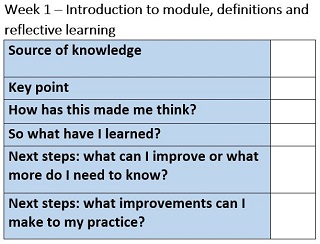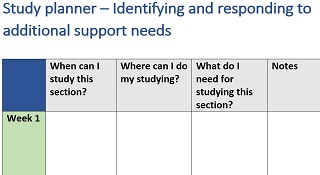Use 'Print preview' to check the number of pages and printer settings.
Print functionality varies between browsers.
Printable page generated Thursday, 5 February 2026, 11:57 PM
Module introduction
Module introduction
This section is in two parts:
Part 1 gives you information relating to the module, including information about the content and a summary of the structure for each week.
Part 2 includes information and guidance aimed at helping you to get ready to study.
Now continue to Part 1 – Module overview.
Part 1 Module overview
Everybody needs additional support in their lives at one time or another. The level of support that we need depends on the situation or difficulties that we face. Of course, babies need a great deal of support from the adults in their lives in order to meet their physical, social and emotional needs. The amount of support decreases as the baby grows and develops, and they become more able to meet their own needs and depend less on the adults around them. However, this is not the same for all children: some may require additional support from the adults around them for longer or more permanently, or at different times in their lives.
As a practitioner it can be challenging knowing when a child requires support, knowing when to intervene or not, or judging what is the ‘right’ amount of support to offer is.
This module is aimed at helping you to:
- increase your knowledge and build your confidence in identifying children who require additional support and respond appropriately
- understand your legal responsibilities in relation to the law regarding additional support for learning, which is the Education (Additional Support for Learning) (Scotland) Act 2004, often referred to as the ‘ASL Act’.
After completing the module, you should have achieved all of the following learning outcomes:
- Identify the broad range of additional support needs (ASN) that children in early learning and childcare (ELC) may have.
- Understand the value of inclusive practice, including the importance of celebrating the strengths and opportunities that children with ASN bring to a setting.
- Explain the need for all staff, not just those with specialist training, to take responsibility to support children with ASN.
- Be aware of the sources of support for ELC staff working with children who need additional support.
- Identify the specialist and cross-professional support that is available to support children with complex ASN.
- Understand legislative duties that support children with ASN.
Scottish Government and the law
Children in Scotland have a right to additional support for learning and this right is clearly outlined in A Blueprint for 2020: the expansion of early learning and childcare in Scotland action plan (2017). In this document there is a commitment to develop high-quality early learning and childcare (ELC) opportunities for all children. This aim will be supported by identifying where children may require additional support so that there is greater opportunity and inclusion for all children. This right is protected by legislation and the module content reflects the Scottish Government’s policy on supporting the Additional Support for Learning Act. The following statement explains the reasons for the Government’s (n.d) commitment to supporting children:
We want all children and young people to get the support they need to reach their full learning potential. We have a system which focuses on overcoming barriers to learning and getting it right for every child.
Week 6 of the module will look at legislation and policy related to working with children who require additional support. However, here is where you can find more about the law on the Scottish Government webpages:
Enquire is the Scottish advice service for additional support for learning appointed by the Government to provide impartial advice and for parents, professionals, children and young people about all aspects of the legislation. It has a phone helpline and website:
Module structure
The module is designed to be studied over six weeks. The content for each week should take around two hours and is divided into four sections. However, every learner is different, and you may find that you take less or more time to complete a piece of learning.
Please take as long as you need to complete the tasks. You may find it helpful to plan your study in advance.
Each week will start with an introduction and an explanation of the week’s learning outcomes. There will be a variety of learning activities, including films, audio recordings and readings. There will be activities to encourage you to reflect on your thoughts and learning after you have completed the activity.
As you work through the course you can save the text you put in the text boxes. This will be available to you any time that you log in to the course. If you want to download any activity answers and any text that you typed and saved in answer boxes, go to the ‘Answers’ box in the left-hand margin and click on ‘Download your answers for the documents on this course’ (see below).

There are extension activities to complete at the end of each session if you wish to further your knowledge each week.
Very importantly, there will be practical tips to develop your knowledge and help you when working with children who require additional support.
Reflecting on your learning
You will be asked to reflect on your learning in the final part of each week. To help you do this there is a downloadable learner journal that has a reflection table to complete for each week. This is where you can make a note of the learning you have taken from the week’s activities. You can also consider what impact the activity will have on your practice in order to improve the experience for children who require additional support.
Learner journal – click image below
(Adapted from Appleby and Hanson, 2017)
Independent study
The content of all the study weeks (apart from Week 3, which contains the webinar) is designed for you to learn independently. In Week 1 there is a section to help you get organised for independent learning and also a part that delivers hints on how to make the most of your studying.
Glossary
Throughout the module, highlighted words will be defined in the glossary.
Collaborative learning
Week 3 is an opportunity for you to take part in an online webinar. You can swap ideas and ask questions with other practitioners who are also taking the module. The aim is to share your ideas, learn from each other and reflect on your learning and experience. There are more instructions of how to access the webinar in Week 3.
There is also a module forum for you to engage with other participants on the course. Please use it to ask questions or discuss any issues that arise as you study. You should be aware that the forum is moderated, so please keep all posts course- and webinar-specific, and always remain respectful to your fellow learners.
If you’d like to post a question or comment, click on the button ‘Start a new discussion’, making sure that you include a title in the subject line.
Getting a badge
This is a badged module. At the end of Weeks 4 and 6 you can complete a quiz in order to gain your badge.
Quizzes are a series of questions that assess your learning. The question types will include multiple choice, true/false, or matching exercises. To help familiarise you with doing the quizzes, there are practice quizzes at the end of each week (apart from Week 3) that will not count towards your badge.
Taking part in a quiz helps you to review and reflect on what you have read and heard. The quizzes have been designed to help you test your knowledge and your thinking. Some questions review facts and have clearly correct answers, but as you’ll appreciate ideas and concepts in this course do not fit easily into yes or no answers. If you find that your answer is incorrect or partially correct consider this response in the way that you would experience disagreement in a professional dialogue. We encourage you to think about the reasons why we might have come to a different conclusion to you. Please try the quiz question again. If you feel that you strongly disagree with any of the answers please post your thinking in the forum.
Part 2 We are all learners
Getting ready to study
It is likely that many people studying this module will be at different levels of readiness to study, and will have had different experiences as learners.
The following activity aims to consider the thoughts or emotions that you may have about learning something new.

Activity 1 Getting ready to study
Planning your learning
No matter what level you are at or how recently you last studied, you may find the study planner helpful to identify how and when you can put aside time for learning. Alongside the study planner you can examine the additional resources to develop your knowledge of how and when to provide additional support to children.
Life can be busy, with spare time limited, so it can be difficult to decide where you are going to find two hours every week that you will need for studying. The weekly sessions have been designed so that they are made up of four sections of learning. The study planner below is designed to help you identify times in the week where you may be able to complete one of the sections.
You may be a learner who would prefer to do the whole two hours of studying in one session; on the other hand, you may find that there are smaller periods of time that you could use to study. What small gaps you may have will depend on your lifestyle. If you commute to work on public transport, you may consider using that time to access the materials via your phone if you have one that will allow you to do that. Depending on where you work, you may decide to use a rest break at work – although this depends on whether you have one or not, so this may be a challenge for childminders working on their own. You may think about using times when you would usually look at a magazine or make a phone call as another study opportunity, for instance whilst waiting for an appointment.
Activity 2 Completing a study planner
Click on the image below and then make notes in the study planner table to identify when in each week you can study.
Figure 1 Study planner – click image
Comment
Hopefully thinking about your weekly routine has helped you to identify periods of time you could use for studying for this module.
Week 1 of the module starts by looking at the aims of the module, what we mean by additional support for learning and considers the importance of reflective learning.
Now continue to Week 1 – Language, definitions and reflective learning.

